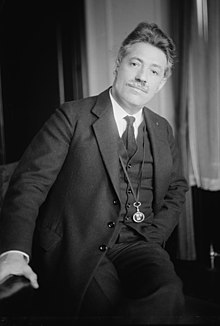Fritz Kreisler
| Fritz Kreisler | |
|---|---|
 |
|
| Background information | |
| Birth name | Friedrich Kreisler |
| Born |
February 2, 1875 Vienna, Austria-Hungary |
| Died | January 29, 1962 (aged 86) New York City, New York, U.S. |
| Genres | Classical |
| Occupation(s) | Composer, violinist |
| Instruments | Violin |
| Years active | 1903–1950 |
| Notable instruments | |
|
Violin Kreisler Guarnerius 1707 Earl of Plymouth Stradivarius 1711 Greville-Kreisler-Adams Stradivarius 1726 Kreisler Guarneri del Gesù 1730c Kreisler-Nachez Guarneri del Gesù 1732 Huberman-Kreisler Stradivarius 1733 Lord Amherst of Hackney Stradivarius 1734 Kreisler Guarneri del Gesù 1734 Mary Portman Guarneri del Gesù 1735c Hart-Kreisler Guarneri del Gesù 1737 Giuseppe Guarneri del Gesù 1740c Kreisler Bergonzi 1740c Jean-Baptiste Vuillaume 1860 |
|
Friedrich "Fritz" Kreisler (February 2, 1875 – January 29, 1962) was an Austrian-born violinist and composer. One of the most noted violin masters of his or any other day, and regarded as one of the greatest violin masters of all time, he was known for his sweet tone and expressive phrasing. Like many great violinists of his generation, he produced a characteristic sound which was immediately recognizable as his own. Although it derived in many respects from the Franco-Belgian school, his style is nonetheless reminiscent of the gemütlich (cozy) lifestyle of pre-war Vienna.
Kreisler was born in Vienna, the son of Anna (née Reaches) and Samuel Kreisler, a doctor. Of Jewish heritage, he was however baptised at the age of 12. He studied at the Vienna Conservatory and in Paris, where his teachers included Anton Bruckner, Léo Delibes, Jakob Dont, Joseph Hellmesberger, Jr., Joseph Massart, and Jules Massenet. While there, he won the "Premier Grand Prix de Rome" gold medal at the age of 12, competing against 40 other players, all of whom were at least 20 years of age.
He made his United States debut at the Steinway Hall in New York City on November 10, 1888, and his first tour of the United States in 1888–1889 with Moriz Rosenthal. He then returned to Austria and applied for a position in the Vienna Philharmonic, but was turned down by the concertmaster Arnold Rosé. As a result, he left music to study medicine. He spent a brief time in the army before returning to the violin in 1899, when he gave a concert with the Berlin Philharmonic conducted by Arthur Nikisch. It was this concert and a series of American tours from 1901 to 1903 that brought him real acclaim.
...
Wikipedia
